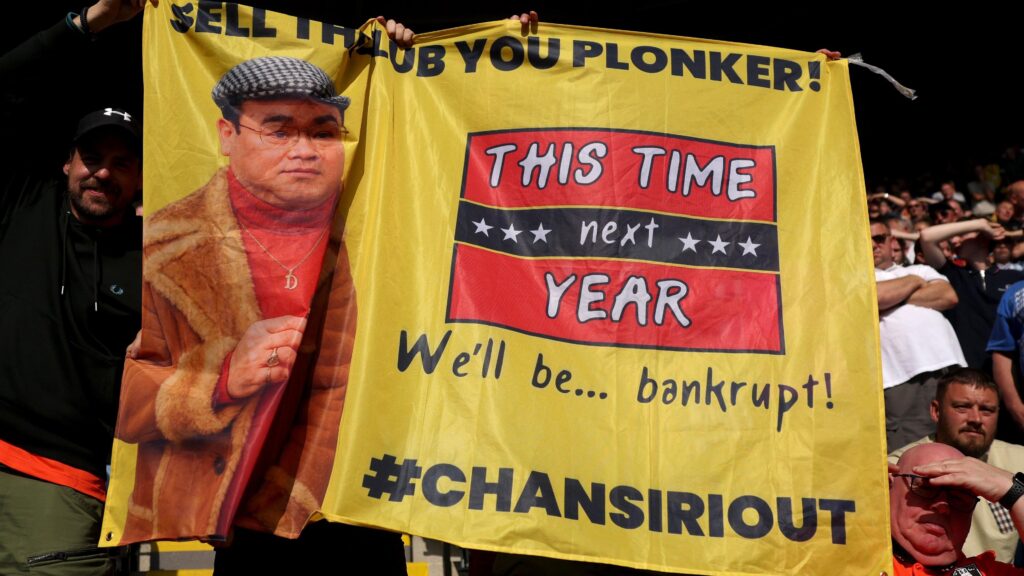The situation surrounding Sheffield Wednesday and its owner, Dejphon Chansiri, has escalated significantly, with passionate protests from the fans highlighting their discontent. As fans gathered outside the King Power Stadium, they voiced their frustrations with chants and banners demanding that Chansiri sell the club. A plane circled overhead, trailing a banner boldly declaring “Dejphon Chansiri Out,” mirroring the discontent felt deeply within the heart of the club’s supporters. This protest, which saw approximately 2,000 fans unite, was marked by a creative demonstration—one fan carried a flag depicting Chansiri as Del Boy from the iconic British sitcom “Only Fools and Horses,” with a clear message: “Sell the club, you plonker!”
For many supporters, the dissatisfaction runs deep, stemming from a decade of unfulfilled promises and deterioration in the club’s fortunes since Chansiri acquired Sheffield Wednesday in 2015. Initially greeted with aspirations for a Premier League return, the tide has turned sharply. Wednesday supporters now feel a sense of urgency to force Chansiri to exit, as illustrated by their collective actions on a recent matchday. Fans even delayed their entry to the stadium to demonstrate their displeasure, waiting until the fifth minute of the game to take their seats, leaving large sections of the away fan area empty as a symbolic gesture.
Chansiri’s tenure has coincided with significant negative events for the club. In 2020, Wednesday was hit with a 12-point deduction for breaching EFL profitability rules, further compounding issues that led to relegation. The situation further deteriorated; the North Stand at Hillsborough has been closed due to structural concerns, and players issued notices critically indicating their dissatisfaction over late payments. The club’s financial woes have also led to staff worrying about their futures, with the Sheffield Wednesday Supporters’ Trust stepping in to provide financial assistance to struggling staff members.
While the protests were largely good-natured, they also highlighted underlying fears and frustrations within the fan base. Fans expressed concerns not just for past decisions but for the future of the club that they cherish. Their plight was accentuated by the stark contrast presented by Leicester City, who have flourished under prior Thai ownership, where Vichai Srivaddhanaprabha was revered not just for his business acumen but also his philanthropy within the community.
Chansiri, on the other hand, has been characterized as distant and non-communicative, further fueling animosity from a fanbase that values connection and transparency from their club’s leadership. The situation, as articulated by Ian Bennett, chairman of the Sheffield Wednesday Supporters’ Trust, reflects a larger breakdown of trust, with many fans lamenting how the non-engagement and perceived negligence from Chansiri are “killing the club.”
The broader context of governance in football adds another layer to this scenario, as the long-anticipated introduction of an independent football regulator approaches. This legislation aims to shield clubs from poor ownership, a move that is welcomed by fans and stakeholders concerned about financial stability in English football. However, for now, there is little the current regulatory body can do to alleviate Sheffield Wednesday’s dire situation, as fans continue to rally behind the hope that a prospective buyer will emerge.
While the club has recently received a solidarity payment from the Premier League, allowing for some immediate financial relief, the long-term prospects remain uncertain. Although the EFL is in discussions with potential buyers, the Sheffield Wednesday Supporters’ Trust is not standing still; proactive measures are being discussed, including plans for a “phoenix club,” should the situation worsen. As representatives like James Silverwood indicate, there remains a significant issue with Chansiri being viewed as an unsustainable seller, overshadowing the availability of credible buyers interested in rescuing the club from its current financial turmoil.
In conclusion, Sheffield Wednesday’s situation encapsulates the struggles of many clubs grappling with ownership-related issues in the English football ecosystem. The passionate display of unity from fans reveals both their deep-seated love for the club and their urgent desire for change. The unfolding events at Hillsborough serve as a stark reminder of the impact of ownership on football clubs and the influential voice that fans can wield in pursuit of accountability and improvement.











